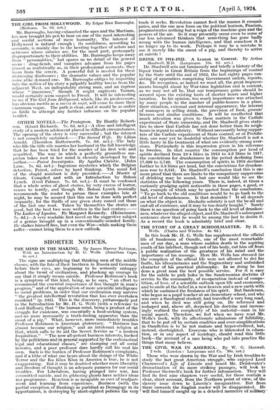DRINK IN 1914-1922. A Lesson in Control. By Arthur Shadwell,
M.D. (Longman. 10s. 6d. net.) Dr. Shadwell sets out luminously and briefly a history of the liquor trade in Great Britain from the beginnings of control by the State until the end of 1922, the last eighty pages con- sisting of appendices comprising Government orders, reports, &c. He recognizes, as indeed we must all, the great improve- ments brought about by War-time legislation and is content, as we may not all be, that our temperance gains should be secured upon the existing basis of shorter hours and higher taxation. In his opinion, too much importance was attached by many people to the number of public-houses in a place, their situation, external and internal appearance, the interest of managers in selling drink, the provision of food, grocers' licences and similar conditions. It will be recollected that much attention was given to these matters in the Carlisle experiment of State ownership, and Dr. Shadwell gives statis- tics to show that Carlisle has not done better than its neigh- bours in regard to sobriety. Without necessarily being suppor- ters of the Carlisle experiment of State control, or of Prohibi- tion, one may yet be doubtful whether Dr. Shadwell is not a little hasty in his treatment of what are evidently strong aver- sions. Particularly is this impression given in his reference to Sweden. In that country the consumption per head of spirits declined from 24.4 litres in 1913 to 4.3 litres in 1917, the convictions for drunkenness in the period declining from 17,699 to 3,749. The consumption of spirits in 1918 declined further to 3.3 litres per head, but the convictions for drunken- ness rose to 6,341. Dr. Shadwell's conclusion that this is one more proof that there are limits to the compulsory suppression of drinking may be sound, but one would like to see the statistics of the following years. There is, indeed, at times a curiously grudging spirit noticeable in these pages, a good, or bad, example of which may be quoted from the conclusions. " To go back to the old conditions would be to go back to the old level of drunkenness. Is that desirable ? It all depends on what the object is. Alcoholic sobriety is not the be-all and end-all of existence, and it may be too dearly bought." Surely there is no question of going back to the old level of drunken- ness, whatever the alleged object, and Dr. Shadwell's subsequent sentences show that he would be among the last to desire it. As a record the book is admirably brief and dear.


























































 Previous page
Previous page